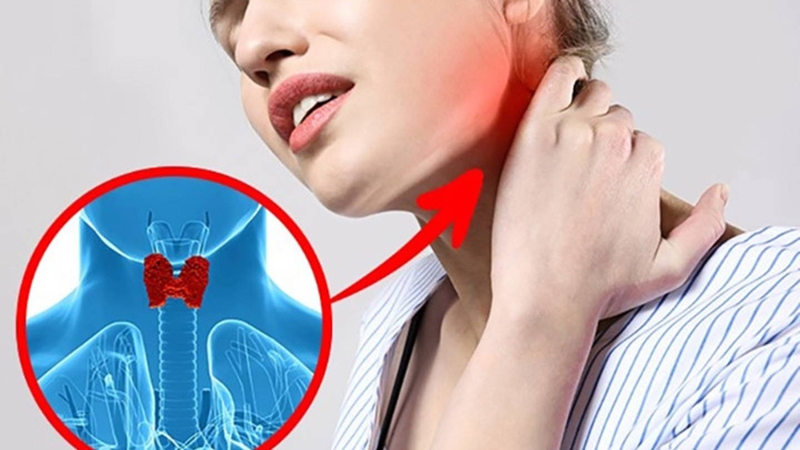Hypothyroidism is a complication of decreased thyroid function, causing the production of thyroid hormones to decrease. From there, it leads to the function and organs in the body being affected. Follow the article below to get more information about this disease.
General information about hypothyroidism
The thyroid is a small butterfly-shaped organ located in the front of the neck and below the larynx. It will have the task of producing the hormones thyroxine (T4) and triiodothyronine (T3) to control metabolism, increase energy production, maintain body temperature and affect the functioning of other organs such as digestion, nerves and cardiovascular system.

The thyroid gland is an organ located in the front of the neck and below the larynx.
When the concentration of thyroid hormones in the blood increases, it causes the pituitary gland to reduce the production of TSH to control the activity of the thyroid gland. When the concentration of thyroid hormones is low, the pituitary gland will produce more TSH. This shows that the balance of thyroid hormones is extremely important. If the level of thyroid hormones is too high, it is at risk of causing hyperthyroidism, and if it is too low, it will cause hypothyroidism.
Hypothyroidism (thyroid dysfunction) is a phenomenon in which the thyroid gland does not produce enough hormones to serve the needs of metabolism and activities of the body. Thyroid hormones will participate in the body’s activities, so they can affect most organs in the body. Therefore, if there is not enough thyroid hormone, the body will be damaged in tissues, organs and metabolic disorders.
Hypothyroidism complications are considered a common condition and often appear after childbirth, during adolescence and adulthood. This disease usually occurs in 1 to 3% of the population, mostly in women, with the frequency increasing with age.
Subclinical hypothyroidism will have mild manifestations and mainly in 3% of men and 7.5% of women. For children, the rate of congenital hypothyroidism is 1/5,000 newborns.
Main causes of hypothyroidism
Hypothyroidism often occurs with common causes and some less common causes.

Hypothyroidism occurs due to many different causes such as radiation therapy, thyroiditis…
Common Causes of Hypothyroidism
When the thyroid gland does not produce enough hormones, hypothyroidism occurs. This is due to a number of reasons including:
- Hashimoto’s disease: This is one of the most common causes. It is an autoimmune disorder that occurs when the body’s immune system creates antibodies to attack healthy tissue.
- Thyroid surgery: Removing part or all of the thyroid gland reduces the ability to produce hormones.
Radiation therapy: Radiation used to treat head and neck cancers can damage the thyroid gland, causing hypothyroidism. - Thyroiditis: The thyroid gland becomes inflamed due to an infection, autoimmune disorder, or other medical condition. This triggers the thyroid to release all of its hormones at once, causing it to work at full capacity and gradually become less efficient.
- Medications: Medications that can cause hypothyroidism include lithium, which is used to treat psychiatric disorders.
Less common causes
In addition to the main causes, this disease is also caused by some less common causes. Including:
- Congenital hypothyroidism: Appears at a low rate of about 1/1700 to 1/3500. This means that in about 1/1700 to 3,000 newborns, one baby will have the disease.
- Excess or lack of iodine: Excess or lack of iodine can affect the production of thyroid hormones.
- Pituitary disorders: Can be caused by tumors in the pituitary gland.
- Pregnancy: Some patients often develop hypothyroidism after pregnancy. It can occur during pregnancy but is not indicated for treatment.
Dangerous complications of hypothyroidism
If hypothyroidism is not treated promptly, it can cause many dangerous complications to health.

Summary of common complications of hypothyroidism that many people encounter today
Below are some specific complications such as:
- Goiter: A large goiter will hinder breathing or swallowing food.
- Peripheral neuropathy: If treatment is delayed, hypothyroidism can damage the peripheral nerves. These nerves are the tools to carry information from the brain and spinal cord to other organs of the body. Peripheral neuropathy will cause pain, numbness and itching in the limbs.
- Reproductive problems: Low thyroid hormone levels will reduce ovulation, limiting fertility.
- Birth defects: Children born to mothers with untreated thyroid disease will have a higher risk of congenital birth defects than normal children. Children with untreated congenital hypothyroidism will have a risk of mental and physical problems.
- Cardiovascular disease: Hypothyroidism puts the body at risk of cardiovascular disease or heart failure.
- Myxedema coma: This is an extremely dangerous complication and requires urgent treatment. This condition occurs frequently in people with hypothyroidism but is not treated for a long time. Patients may experience symptoms such as coma, rapid hypothermia, convulsions, respiratory failure and loss of reflexes.
Treatment of hypothyroidism
To treat complications of hypothyroidism, using medication to supplement hormone levels is the most common method. The doctor will prescribe L – T4. This is a safe drug so it can be used for pregnant women. After that, doctors can conduct blood tests to adjust the appropriate amount of medication for the patient.

Using drugs to treat hypothyroidism
This disease can be controlled if treated properly according to the prescribed regimen. However, patients cannot arbitrarily reduce or stop taking medication without consulting a doctor. This can make the disease worse and cause serious complications of hypothyroidism. Pregnant women with this disease need active treatment to avoid the fetus having goiter.
In the above article, we have shared about complications of hypothyroidism, causes and some basic symptoms. Low thyroid hormone levels will cause some symptoms of the disease. Therefore, if signs of the disease are detected, patients should quickly check and treat.





